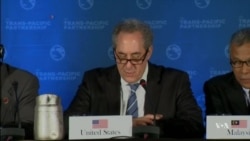The United States and 11 other countries reached agreement Monday on a massive free trade deal that will lower trading barriers and set common standards among Pacific Rim countries that together account for nearly half of the world’s global output. News of the landmark trade agreement was announced Monday in Atlanta. Now it’s up to lawmakers in all of the countries to determine if the terms of the Trans-Pacific Partnership, or TPP, is in their country’s best interests. Mil Arcega has more.
"We the trade ministers of Australia, Brunei Darusssalam, Canada, Chile, Japan, Malaysia, Mexico, New Zealand, Peru, Singapore, the United States and Vietnam are pleased to announce that we have successfully concluded the Trans-Pacific Partnership negotiations," said U.S. Trade Representative Michael Froman.
After five years of back and forth negotiations – 12 Pacific Rim nations say they have a deal - one that U.S. Trade Representative Michael Froman says will lower tariffs and improve living standards across the Asia-Pacific region.
"We expect this historic agreement to promote economic growth, support higher paying jobs, enhance innovation productivity and competitiveness, raise living standards, reduce poverty in our countries, and promote transparency, good governance and strong labor and environmental protections," said Froman.
Lawmakers have 90 days to ratify the deal. But very few expect easy passage in Congress.
Scott Kennedy is an expert on global economic relations at the Center for Strategic and International Studies.
“This will be a very contentious debate where they talk about all the different issues, and since we're entering the silly season of campaigns for 2016, you’re going to see every argument thrown at this deal," said Kennedy.
The strongest opposition is expected to come from labor groups and from President Obama’s own party, which claim the pact will lead to job losses and hurt the environment. But free trade advocates say the agreement will expand U.S. exports and open doors for American farmers. It also extends patent protections for some U.S. drug makers.
“It’s a proven fact that even though some sectors, some specific companies, may lose, by and large, the economy as a whole will gain. More jobs ought to be created as a result of this deal, rather than less," said Kennedy.
Analysts say TPP expands U.S. opportunities in the Pacific and could counter the growing influence of China, now the world's second largest economy.






